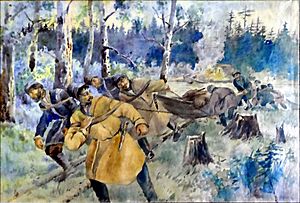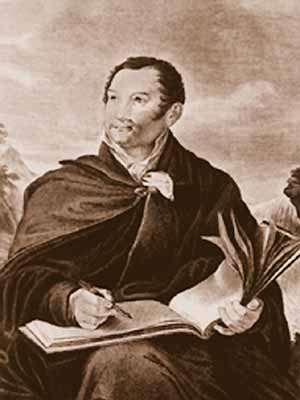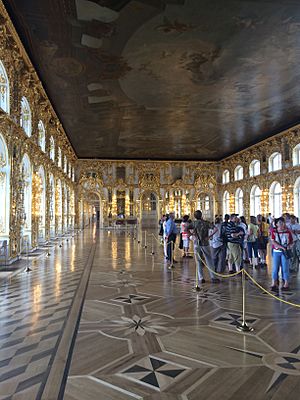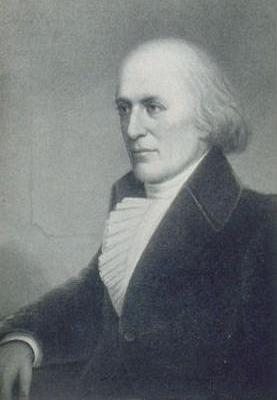Russia and the American Revolution facts for kids

The Russian Empire played a part in the American Revolutionary War, which was a big global fight. This war was about who would control colonies between the Thirteen Colonies (which became the United States) and Great Britain. Even before the war started, Russia, led by Catherine the Great, was already exploring the west coast of North America. Just one year after the war ended, Russia even set up its first colony in Alaska.
Russia didn't send soldiers or supplies directly to the American colonies or the British during the war. However, Russia reacted to the Declaration of Independence. It also played a role in important international talks and helped shape how the American Revolution was seen around the world.
Contents
Russia's Early Steps in North America
While other European countries moved west across the Atlantic Ocean, the Russian Empire expanded east. They took over the huge lands of Siberia. At first, Russia wanted to increase its fur trade. But the Russian court in St. Petersburg also hoped this eastern expansion would show that Russia was a strong European power in culture, politics, and science. After reaching the Pacific Ocean in 1639, Russia looked towards North America.
From 1729 to 1741, the Russian government supported explorers Vitus Bering and Aleksei Chirikov. They led a big trip to find North America. In their first try in 1729, they missed the Alaskan coast because of thick fog. When they tried again in 1741, Chirikov reached the coast of Southeast Alaska. Sadly, his search party was attacked by native Tlingit people and killed. Chirikov quickly sailed back.
Bering had even worse luck. He landed in central Alaska. On his way back, he sailed along the Aleutian Islands. He and his crew had a very hard winter on one of the islands, and many men died. But when Bering's remaining crew returned, they brought back over nine hundred valuable sea otter furs.
These furs made many people interested in the fur trade. Russian fur traders, called Promyshlenniki, rushed to Alaska hoping to get rich. To get furs, these traders often treated the native Aleut people very badly. They used fear and forced them to trade. This also caused a lot of harm to the environment. Many animals were hunted so much that they almost disappeared. The Aleut tribes fought back in 1764, but the Russians defeated them in 1766.
Before the American Revolutionary War, Russia's expansion into North America helped its economy and made it look more important. However, it also harmed Alaska's wildlife and brought much suffering to the Aleut people through sickness, fighting, and unfair treatment.
How Russia Reacted to the Declaration of Independence
News of the Declaration of Independence reached Russia on August 13, 1776. A Russian ambassador in London, Vasilii Lizakevich, wrote to Russian statesman Count Nikita Panin. He praised the American leaders for their courage and good actions shown in the Declaration. It's interesting that Lizakevich didn't mention the "natural rights of man" from the document. He only focused on what the American leaders did.
When Catherine the Great heard about the Declaration, she thought Britain's own mistakes in how it ruled its colonies caused the Americans' actions. She also believed that the colonies separating from Britain would not hurt Russia. In fact, she thought it might even help Russia.
More information about Russia's view of the Declaration comes from Pavel Petrovich Svinyin. He was a Russian representative in the United States from 1811 to 1813. Svinyin wrote that American citizens seemed to enjoy almost all the freedoms listed in the Declaration and the U.S. Constitution. However, the full text of the Declaration of Independence was actually banned in Russia until the time of Tsar Alexander II (1855-1881). Historians think this was because the Declaration's ideas of freedom didn't match the Russian monarchy's policies.
The Declaration of Independence also inspired some members of Russia's Decembrist Uprising. For them, America was like a "motherland of freedom." Even though the Declaration wasn't fully published in Russia before their revolt, its ideas still reached some people in Russian society.
Russia's Role in War Diplomacy
Catherine the Great, who ruled Russia from 1762 to 1796, played a small but important role in the American Revolutionary War. She did this by talking with other European leaders. At first, she was very interested in the American fight because it affected "English and European politics." She truly believed that Britain was to blame for the conflict. She didn't think highly of King George III or his diplomats.
Even so, the British government formally asked Russia for 20,000 soldiers in 1775 and wanted an alliance. Catherine refused both requests. When Spain joined the war, Britain again asked Russia for help, this time for naval support. Catherine II ignored the British requests once more.
Perhaps Catherine the Great's biggest diplomatic move was creating the First League of Armed Neutrality in 1780. This declaration said that countries that were not fighting in the war could still trade freely. It had three main rules:
- Neutral ships could visit ports of countries at war.
- Goods from countries at war could be carried on neutral ships without problems, except for war supplies.
- A port was only considered "blockaded" if enemy ships were actually stopping entry.
Most European nations agreed to these rules. But Britain refused because it hurt their strategy of blocking ports. After setting up this group of neutral countries, Catherine the Great tried to help the United States and Britain find peace. She suggested a ceasefire plan. However, the Battle of Yorktown happened during her efforts, which ended any hope for a peaceful solution to the war.
During these talks, Britain tried to bribe Russia in 1780. London offered St. Petersburg the island of Minorca if Russia would join Britain in the war. Even though this island would have helped Russia's economy, Catherine the Great refused the bribe. She used it as a chance to make King George III look foolish to other European powers.
Some historians think that Catherine the Great's actions during this time were simply for Russia's benefit. They believe she didn't truly care about the cause of the Thirteen Colonies.
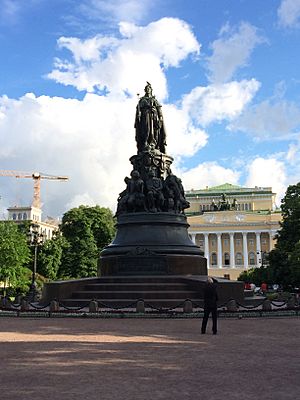
Francis Dana's Diplomatic Mission
Francis Dana was the American ambassador to Russia from 1780 to 1783. His main goal was to get the United States to join the armed neutrality agreement in St. Petersburg. He also wanted to arrange a friendship and trade treaty.
Dana faced some challenges. First, Russia had not yet officially recognized the United States as a country. Second, Russia couldn't formally accept a representative from a country it didn't recognize. Dana argued that America was a nation because of the Declaration of Independence, not because of a peace treaty with Britain. However, the Russian government didn't like his arguments about popular rule.
Because of these problems, Dana's mission was difficult. He left Russia the day after the peace treaty between the United States and Britain was signed. He had spent years in Russia without completing his main goal.
Many historians believe Catherine II refused to recognize Dana because Russia wanted to avoid conflict with Great Britain. However, Catherine the Great also used her refusal to acknowledge Dana as a way to gain power in her own plans, like her takeover of Crimea. She told other leaders that she stayed neutral in their conflicts, so they shouldn't interfere with her affairs. This political maneuvering might have also contributed to Dana's mission failing.
Lasting Impact of the War on Russia and America
Russia played a more important role in the American Revolutionary War than many people realize. Catherine the Great helped arrange talks between European powers and America. This helped make the American cause seem more legitimate and gained support for it among other European nations. Her political actions helped isolate Britain in Europe, which ultimately helped the young American republic win.
The "Declaration of Armed Neutrality" by Russia was very important internationally. The American Continental Congress officially approved it in October 1780. If Catherine the Great had not worked with other powers and negotiated neutrality, and instead had supported Britain, the American Revolution might have turned out very differently.
Beyond Russia's influence on the United States during the war, the two countries had many good relationships. Scholars like Benjamin Franklin from America and Mikhail Lomonosov from Russia had connections. The Russian Academy of Sciences even made Franklin an honorary member in November 1789. Russia and America also had a good trading relationship. Even though no Russian ships went directly to American ports during the war (because of Russia's neutrality), many merchants from both countries traded freely after 1783.
In December 1807, Russia officially recognized the new American republic. This allowed for top-level diplomatic exchanges. On December 18, 1832, the two countries signed a formal trade treaty. President Andrew Jackson said this trade "furnishes new motives for that mutual friendship which both countries have so far nourished." President Thomas Jefferson even called "Russia as the Power friendliest to the Americans." Clearly, the American Revolution started a trend of positive relations between the two states.
Despite these good connections, there was a big difference in ideas between Russia (a monarchy) and America (a democratic republic). Even though America's victory weakened the British Empire, the American Revolution "provoked a sharply negative reaction" from Russia's ruling class and likely in other European countries. It was not possible to openly talk about changes to Russia's political system, the idea of revolution, or democratic freedoms during this time. However, people could "write more or less objectively about the right to freedom and independence of the American people, and its experience of victorious revolutionary struggle against England."
This idea of revolution inspired Russian writers Alexander Radishchev and Nikolay Novikov. They wrote about American successes, spoke against slavery, and criticized the destruction of Native American cultures. Over time, the American Revolution even inspired some members of the Decembrist Revolt in St. Petersburg. For them, America was a "motherland of freedom." Although a revolution in Russia didn't succeed until 1917, the ideas that inspired American patriots created changes in the Russian Empire.
 | Roy Wilkins |
 | John Lewis |
 | Linda Carol Brown |


